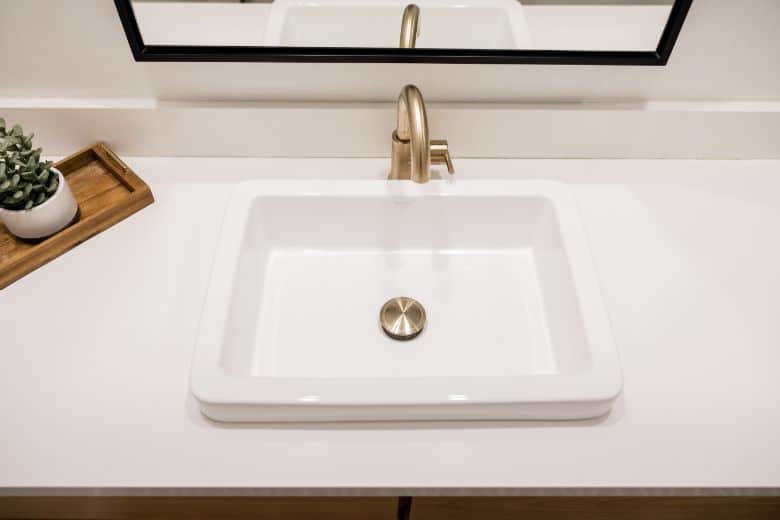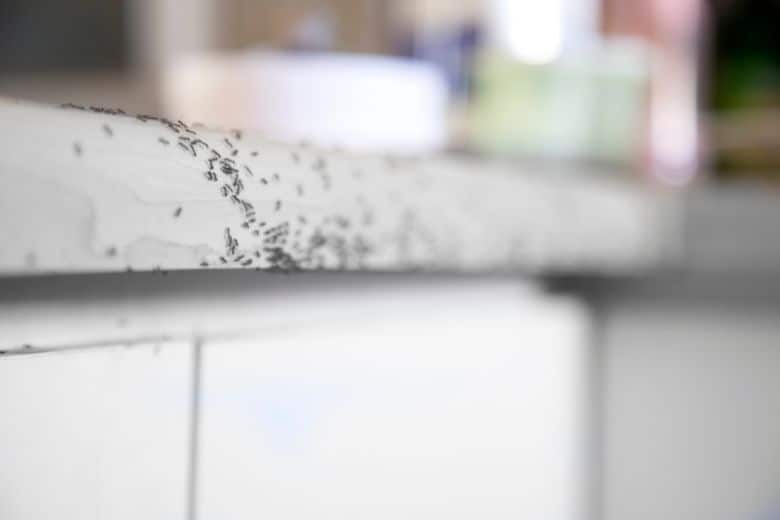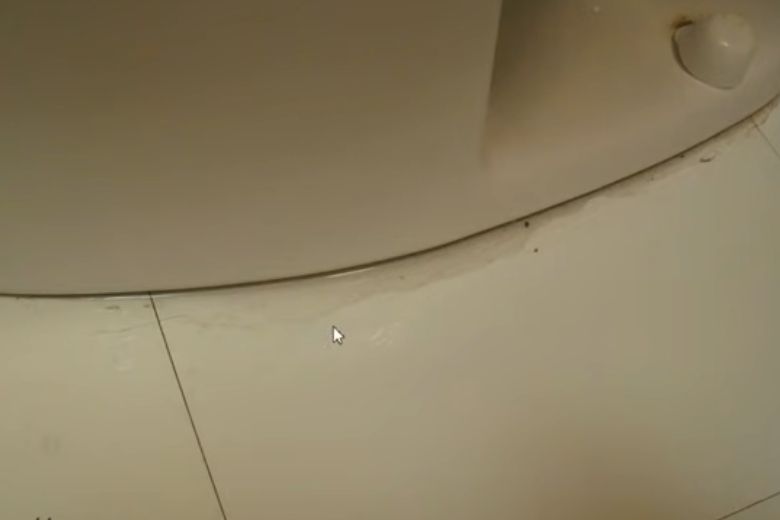Ants are the most common insect in every household that are often bothered when they appear in unexpected places. Obviously, seeing a line of ants’ family coming out or going in your bathroom sink gives you a sense of irritation.
Consequently, you begin to think, why are ants coming out of my bathroom sink?
However, ants in your bathroom sink can be due to various reasons. They could be attracted to moisture, residual food particles, or pheromone trails from other ants. Bathrooms are typically humid environments and can provide a reliable water source for ants. On the other hand, the residual sugars, proteins, or carbohydrates in discarded grooming or hygiene products can serve as food sources and attract ants in the bathroom sink.
Whatever the reason, you must want to eliminate the ant’s presence, right?
So, without further talk, let’s get into the details and learn how to solve this problem.
Why Are Ants Coming Out of My Bathroom Sink- 10 Reasons and Solutions
Although ants can infest any part of your home, the bathroom sink is a common area. Here are ten detailed reasons ants generally come out of your bathroom sink.

1. Attracted by Moisture
Ants, particularly the carpenter and odorous house ants, are attracted to moisture. Hereafter bathrooms provide a consistent water source, which ants need for survival. Leaky pipes, residual water in your sink, or even high humidity levels can all attract ants to this area of your house.
2. Search for Food
While bathrooms are not typically a source of food. But specific grooming or hygiene products may contain sugars, proteins, or carbohydrates that can attract ants. Even tiny droplets of toothpaste or residual soap can be a food source for these pests.
As a result, they come to your sink for food.
3. Pheromone Trails
When an ant finds a reliable food or water source, it returns a pheromone trail to its colony. This scent trail leads other ants to the exact location. If one ant found its way to your bathroom sink and found it satisfactory, it could have left a pheromone trail, guiding other ants there.
And this way, you began to see lots of ants in your bathroom sink.
4. Nesting in the Plumbing System
Ants might be coming out of your sink in search of food or water because they have a nest in your home’s plumbing system. Small cracks and crevices in the plumbing provide ideal nesting spots for ants. It is particularly Pharaoh ants, known to nest in hard-to-reach locations.
Yes, it could be another reason you find ants in your bathroom.
5. Seasonal Changes
Ant infestations in your bathroom sink may also be linked to seasonal changes. During dry or hot seasons, ants may move indoors for a more hospitable environment and water.
At times, changes in outdoor conditions can force ants to seek refuge inside your home. For example, during periods of heavy rain, ant colonies can get flooded, prompting them to relocate. Similarly, they may move indoors for moisture and cooler temperatures during extreme drought or heat.
Your bathroom sink provides a water source and a controlled environment, making it a popular choice for these displaced ants.
6. Unsealed Entry Points
Gaps, cracks, or other unsealed spaces around your plumbing fixtures and structures can act as entry points for ants. The tiny size of most ant species enables them to pass through these spaces and establish a route to your bathroom sink.
7. The Presence of a Super Colony
A super colony refers to a massive community of ants spanning large territories, with multiple queens and interconnected nests. If your bathroom sink attracts ants, it may be because your home is above or adjacent to a super colony.
These ants can travel long distances in search of resources and may find their way into your bathroom sink via your plumbing system.
8. Lack of Natural Predators
In their natural habitat, ants have a variety of predators, including spiders, birds, and other insects. These predators are usually absent inside your home, providing ants with a safe environment to explore and collect resources.
9. Building Materials Attracting Ants
Some ants, such as carpenter ants, are attracted to moist wood. If the wooden structures surrounding your bathroom plumbing are damp, these ants could be attracted to this area. Over time, they can cause significant damage as they hollow out the wood to create nesting spaces.
10. Abundance of Hidden Paths
Ants are small and versatile creatures that can navigate through the tiniest gaps in your home. It includes areas within walls, behind tiles, and in the plumbing system. The complexity of these hidden paths might lead them directly to your bathroom sink, where they emerge in search of resources.
Effective Ways to Get Rid of Ants in Your Bathroom Sink
Now you know why ants are coming out of the bathroom sink. It’s time to learn the technique for dealing with it. Luckily, there are several preventative measures you can take to keep these tiny invaders at bay. Have a look one by one and select which solution fits you best.
1. Keep Your Bathroom Clean
The simplest way to prevent ants is by maintaining cleanliness. Wipe down your sink and counter regularly to remove residual water, soap, toothpaste, or other substances that attract ants. Be sure to clean different parts of the bathroom, such as the bathtub, toilet, and floor. A clean bathroom is less likely to attract ants.
2. Seal Potential Entry Points
Inspect your bathroom for cracks or crevices that might serve as ants’ entry points. Look around the sink, pipes, walls, and windows. Use caulk or a similar sealant to close these gaps and prevent ants from entering your bathroom.
3. Use Ant Baits
Ant baits are a valuable tool for managing ant infestations. The bait attracts ants, carrying the poison back to their colony, killing the entire nest over time. Place baits near the sink or any areas where you frequently see ants. Follow the instructions on the product label for safe and effective use.
4. Regularly Check and Repair Leaky Faucets
A dripping faucet can be a significant attraction for ants as it provides a constant water source. Regularly check your bathroom fixtures for leaks and repair them promptly. It prevents ant infestations, conserves water, and prevents potential water damage.
5. Maintain Proper Ventilation
Bathrooms with poor ventilation can have high humidity levels, which can attract ants. Ensure that your bathroom is well-ventilated, either naturally or with exhaust fans. It can help control moisture levels and make the environment less appealing to ants.
6. Borax and Sugar Trap
This trap exploits the ants’ love for sweet things and uses borax, lethal to ants. Mix equal parts of borax and sugar to create the web and add enough water to make a syrup paste. Place this mixture on a flat surface near the sink.
The ants are attracted to the sugar and carry the lethal borax back to their colony. Be careful with this method if you have pets or small children; borax can be harmful if ingested.
7. Lemon or Orange Peels
Citrus peels are another natural ant deterrent due to their strong scent. They contain a substance called d-limonene, which is toxic to ants. Place ground-up lemon or orange peels near the sink or other areas where ants appear.
Alternatively, you can squeeze the juice from these fruits and mix it with water to spray in areas with ant activity. Remember to wipe the surface afterwards, as the citrus juice can become sticky.
8. Use of Essential Oils
Certain essential oils can deter ants due to their strong scents that disrupt ant trails. Peppermint, tea tree, and eucalyptus oils are often used. Mix a few drops of essential oil with water in a spray bottle.
Next, spray it around the bathroom sink and other areas where you’ve noticed ants. Not only can this deter ants, but it will also leave your bathroom smelling great.
9. Cucumber or Citrus Peels
Like the lemon and orange peel remedy, cucumber and other citrus fruit peels can also effectively deter ants. Ants dislike the scent of these peels and tend to avoid areas where they are present. Place these peels near your bathroom sink. Replace the peels every few days for the best results.
10. Hire a Pest Control Service
In case the ant infestation is extensive, or DIY methods fail to resolve the issue, you must hire a professional pest control service.
Because home remedies are often most effective for minor infestations. Professional pest control may be the best option if the ant problem in your bathroom sink is severe or persistent.
Frequently Asked Questions
Why do I see more ants in my bathroom during summer?
Answer: Ants are more active in warm weather. During summer, they search for water, leading them to bathrooms.
Are ants in the bathroom a sign of a larger infestation?
Answer: Not always, but if you consistently see ants or notice a trail, it signifies a more extensive infestation.
Can ants cause damage to my bathroom?
Answer: Ants like carpenter ants can damage damp, decaying wood, but most ants are more of a nuisance than a danger.
Can ants come back after they are eliminated?
Answer: Ants can return if the underlying attractants and entry points are not addressed. Taking preventive measures and maintaining cleanliness will help reduce the chances of a recurring infestation.
Conclusion
Hopefully, you got the answer to the question, “Why are ants coming out of my bathroom sink”. Besides, acknowledge a few methods and techniques to get rid of them. Always remember that prevention is the best long-term solution to keep ants from invading your bathroom.
Paul Newman is a blogger who writes about plumbing and home improvement. Over the past 20 years, I have worked as a plumber. My passion is to share my knowledge and experience with others to improve their homes.




